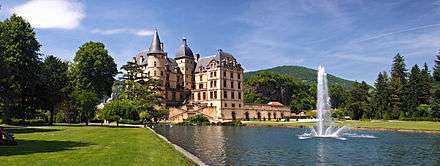Château de Vizille
The Château de Vizille is a castle in the French town of Vizille near Grenoble. It is one of the most prestigious and important castles of the Dauphiné Region. Traditionally since the 14th century the Dauphiné was the homeland of the inheritor of the French throne. Today the Château de Vizille houses the Musée de la Révolution française de Vizille.
History
The former castle was held during the French Wars of Religion by the Catholics. With the peace settlement in 1593, the property was bought by the leader of the Protestant Army, François de Bonne, duc de Lesdiguières.
From 1604 till 1619 the Duke, who became Pair of France and the last Connetable in French History had his castle built to highlight his important role in the French court. The castle is surrounded by a wall of seven kilometers in length.
At the end of the 18th century, the castle and its surrounding property were bought by Claude Perier, a local businessman, who set up a textile factory in it. After the Day of the Tiles in Grenoble, on 21 July 1788, he allowed the estates general of the Dauphiné to meet in a tennis court in the castle, after it was banned from gathering at Grenoble. The Perier family owned it until 1895, during which time the castle itself was made a monument historique in 1862.
One of the owners Adolphe-Joseph-Scipion Perier, son of Augustin Perier was married to a granddaughter of General Lafayette.[1]
In 1924 the castle became the property of the French State and in 1973 the castle was given by the French government to the Community Council of Isere.
The Park

The castle park has a total of 320 acres of space, and is the most popular site in the Isère region with 804,511 visitors in 2008.[2]
The park was classified as a historic monument on 23 August 1991. The design of the park dates from the 19th century.
Coordinates: 45°4′31″N 5°46′23″E / 45.07528°N 5.77306°E
References
External links
| Wikimedia Commons has media related to Château de Vizille. |
